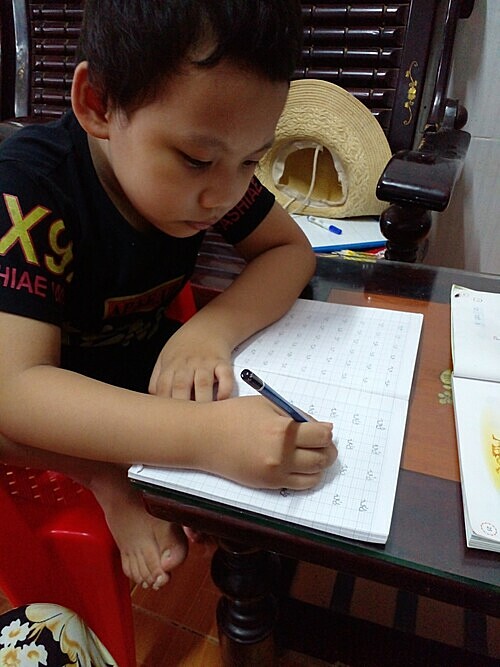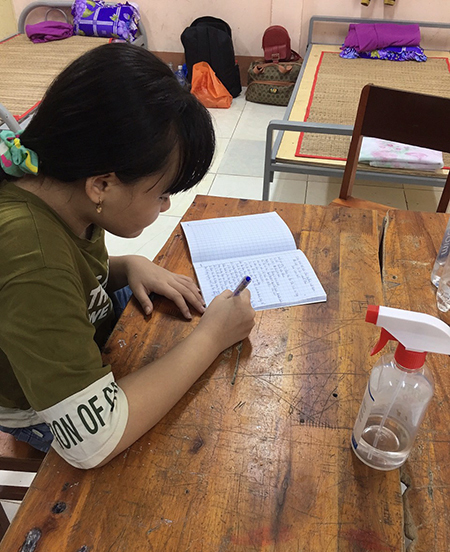Nguyen Thi Huong can no longer be a grandmother to her grandchildren. She has to mother them now, not in the city they are used to, but in her village.
She lulls them to sleep and calms them down whenever they get startled or become fearful.
Covid-19 has devastated the family of the two children again and again.
After their father passed away in a hospital at the end of July, their mother died six hours later at another hospital in Ho Chi Minh City and their parternal grandfather died in a quarantine facility five days later.
Tran Khanh Nhu and Tran Dang Huy, 13 and 6, are no longer in a familiar world.
As their sole living relatives, Huong and her husband have had to move their grandchildren from HCMC’s District 8 to their village in Dong Nai Province. Although the couple had retired from their fishing vocation a few years ago, her husband now gets up early to prepare tools and fish on the Dong Nai River, trying to earn several hundred thousand dong (VND100,000 = $4.36) a day to support his family with the orphaned grandchildren.
Nhu and Huy are among many children forced to move out of their familiar environments and move to new ones after Covid-19 took their parents’ lives.
 |
|
Tran Dang Huy studies at his grandmother’s house in Dong Nai Province, December 2021. Photo acquired by VnExpress |
The Institute of Labor Science and Social Affair under the Ministry of Labor, Invalids and Social Affairs said at the Vietnam Economic Forum 2021 that as of Dec. 5, the pandemic has left almost 2,500 children orphaned. Of them, approximately 100 children have lost both parents to Covid.
Accompanying the traumatic loss of parents is the loss of their home and having to live with relatives in strange locations.
“The fourth wave of Covid-19 (starting in April) has upended the lives of many children, leaving many with no familiar place to lean back on,” said Nguyen Thi Thu Huyen, program director of the educational charity Teach For Vietnam.
Tran Thi Tuyet Ngan, 11, has learnt to live alone in a dilapidated house in southern Soc Trang Province after her mother died of Covid-19. Her father was fatally electrocuted six years ago.
Even before her mother died, Ngan’s family had been the poorest in the community.
Her older brother, Trinh Van Nhan, had to drop out of school after their father died and go to HCMC to sell fruits at the Thu Duc wholesale market. A year later, her mother too Ngan to the city and worked as a porter. The three family members lived in a 15 square meter room near their workplace.
Ngan’s mother contracted Covid in August this year and died after seven days of treatment at a field hospital. The brother and sister returned to their hometown after collecting their mother’s ashes.
After constructing a cemetery for their mother, Ngan’s brother received a phone call from the shop’s owner, urging him to return to work.
Since he couldn’t physically take care of his sister because he had to work from 6 p.m. to 6 a.m., Nhan had to ask his uncle to take care of Ngan while he was away.
 |
|
Tran Thi Tuyet Ngan studies in a centralized quarantine facility before returning to her hometown in Soc Trang Province, September 2021. Photo courtesy of Ngan |
On the day he returned to HCMC, the 21-year-old left home in the middle of the night while his sister slept because she wouldn’t let him go. He left her a note.
The note said: “Stay focused on your studies. I’m going to work to earn more money, and I will be back with you next month on father’s death anniversary.”
La Linh Nga, director of the Psycho-Pedagogy Research And Application Center (PPRAC), said children who lose a loved one unexpectedly can suffer long-term negative psychological impacts and react unpredictably.
Grandma Huong regularly rubs Huy on the back when he wakes up after weeping in the middle of the night.
“Go to sleep, your parents will come back tomorrow,” she says.
She hasn’t dared to reveal the truth to her 6-year-old grandson.
She drove to him to HCMC about a month ago after the situation had eased to pack their belongings and returned the leased room. When the boy arrived at his house and he saw his parents’ belongings, he held them and cried.
As his grandmother tried to pack the parent’s clothes, the boy asked: “If you take Dad’s and Mom’s clothes, what will they wear when they get back?”
Thirteen-year-old Nhu, on the other hand, hides her feelings from her grandparents. Every night, she sits alone in her room, holding photographs of her parents and sobbing in the pillow before falling asleep.
Ngan has been taking online classes at her parent’s house after her brother departed. The girl only goes to her uncle’s house when it is time to eat and sleep.
Nhan calls his younger sister anytime he has spare time. She cries and blames him for not taking her to Saigon.
“When I have everything settled, I’ll bring you here,” Nhan promise. He has just applied to work overtime at a company in the hopes of increasing his income. “I have to do this for my sister,” he said.
Huyen with Teach for Vietnam said losing a loved one and then abruptly moving to a new location will leave a child in shock. She said guardians should try and limit the changes in everyday routines can aid children in some ways. The guardians should understand from the children what their family’s everyday routines were and keep some of the activities and habits that don’t have to be changed.
Family gatherings during holidays and festive occasions like Tet (Lunar New Year) can cause the bereaved children to feel more lonely than usual and feel more the pain of not having their parents. Therefore, the guardians and other loved ones should stay close to the children for at least the first two years and maintain regular routines, Huyen said.
She also said that having a honest, frank conversation about a parent’s death can benefit children more than avoiding the truth or lying to them.
The adults around them can remind them of their parents’ positive qualities and urge them to pray together that good things always happen to their parents in the afterlife, she added.
Now, whenever her younger brother cries, Nhu no longer turns her face away. Instead, she rushes to console him. She points to the sky and tells Huy that their parents are like stars looking over the them.
“Our parents will be pleased if their children are doing well in school and helping their grandparents with housekeeping,” she says.
“My eyes sting when I listen to her,” Huong stated.
But she said she also recognized that despite all the difficulties and challenges, as long as the children are healthy and the family has each other, they will be able to weather the storm.
- Reduce Hair Loss with PURA D’OR Gold Label Shampoo
- Castor Oil Has Made a “Huge” Difference With Hair and Brow Growth
- Excessive hair loss in men: Signs of illness that cannot be subjective
- Dịch Vụ SEO Website ở Los Angeles, CA: đưa trang web doanh nghiệp bạn lên top Google
- Nails Salon Sierra Madre
 VnExpress News The News Gateway of Vietnam
VnExpress News The News Gateway of Vietnam
